Introduction
Trademark law in India plays a pivotal role in protecting the identity and branding of businesses, fostering consumer trust, and promoting healthy competition in the market. Over the years, a series of landmark cases have emerged that have not only clarified the legal framework but have also set important precedents for trademark disputes. In this article, we delve into several such significant cases that have shaped the landscape of trademark law in India.
India, with its diverse and dynamic market, has witnessed its fair share of trademark disputes. These disputes often revolve around issues such as brand identity, consumer confusion, and the protection of intellectual property. The outcomes of these cases have not only influenced the legal community but have also had a profound impact on how businesses approach branding and trademark protection.
One such landmark case is the “Yahoo!, Inc. v. Akash Arora & Anr.” This case, which revolved around the use of the Yahoo! trademark in India, brought to light the complexities of trademark jurisdiction in a digital age. It set the stage for discussions on global brand protection in an interconnected world.
In “DM Entertainment v. Baby Gift House and Ors.,” the clash between an entertainment company and a gift retailer highlighted the importance of protecting trademarks across different industry domains. This case serves as a reminder that trademark disputes can arise in unexpected contexts, emphasizing the need for comprehensive trademark strategies.
These cases are not just legal battles; they are a reflection of the evolving business landscape in India. The “Milmet Oftho Industries & Ors. V. Allergan Inc.” case, for instance, brought forth issues related to pharmaceutical trademarks, showcasing the unique challenges posed by this industry. It underscored the need for precision and clarity in trademark registration for pharmaceutical products.
Furthermore, the “Coca Cola Company v. Bisleri International Pvt. Ltd.” case stands as a testament to the enduring value of iconic brands. This clash between two well-known beverage giants raised questions about brand dilution and the limits of trademark protection. It showcased how brand equity can be both an asset and a liability in the world of trademarks.
In the subsequent sections of this article, we will dive deeper into these cases and several others, dissecting the legal intricacies, key issues, and the impact of each case on trademark law in India. These landmark cases collectively offer valuable insights into the evolving nature of trademark protection and the challenges that businesses and legal practitioners face in safeguarding their intellectual property in a rapidly changing marketplace.
Case Study 1: Yahoo!, Inc. v. Akash Arora & Anr (Domain Name Dispute)
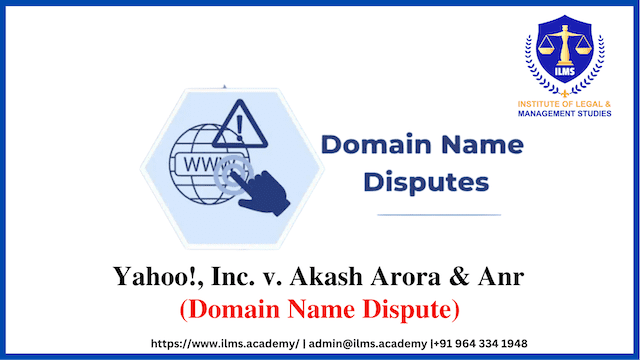
Case Background and Context:
The case of Yahoo!, Inc. v. Akash Arora & Anr. marked a significant milestone in Indian trademark law. Yahoo!, a globally recognized internet giant, found itself entangled in a legal battle with Akash Arora and Anr., who were operating a web portal with the domain name ‘YahooIndia.org.in.’ The central issue in this case was the alleged infringement of Yahoo!’s trademark and the domain name dispute.
Yahoo!, Inc. had established itself as a prominent player in the digital world, providing a wide range of internet services. Its brand, represented by the distinctive ‘Yahoo!’ name and logo, had garnered immense recognition and goodwill. The company argued that the use of the ‘YahooIndia’ domain name by the defendants created confusion among consumers, leading them to believe that the website was affiliated with or endorsed by Yahoo!, Inc.
Discussion of Key Issues Involved:
1. Trademark Infringement: The primary issue revolved around trademark infringement. Yahoo!, Inc. contended that the defendants’ use of a domain name closely resembling its own trademark could mislead consumers and dilute the distinctiveness of its brand. This raised questions about the extent of protection afforded to well-known trademarks and the potential for consumer confusion in the digital realm.
Certificate Course in Labour Laws Certificate Course in Drafting of Pleadings Certificate Programme in Train The Trainer (TTT) PoSH Certificate course in Contract Drafting Certificate Course in HRM (Human Resource Management) Online Certificate course on RTI (English/हिंदी) Guide to setup Startup in India HR Analytics Certification Course
2. Domain Name Dispute: The case also highlighted the importance of domain names in the context of trademark law. Domain names have become essential assets for businesses, and disputes over their ownership and usage have become increasingly common. The case underscored the need for clear guidelines on domain name disputes, especially when they involve globally recognized trademarks.
The Court’s Decision and Its Impact on Trademark Law:
In its decision, the court ruled in favor of Yahoo!, Inc. The judgment emphasized the importance of protecting well-known trademarks and preventing their dilution through unauthorized use. The court recognized that Yahoo!’s trademark had achieved a high level of distinctiveness and enjoyed strong consumer recognition. Therefore, any use of a similar name or domain name that could potentially mislead consumers was deemed infringing.
This case set a crucial precedent in Indian trademark law. It affirmed the principle that well-known trademarks deserve robust protection to maintain their distinctiveness and prevent consumer confusion. Furthermore, it highlighted the need for vigilance in the digital space, where domain names can be easily exploited to create confusion.
The impact of Yahoo!, Inc. v. Akash Arora & Anr. case extended beyond the immediate parties involved. It served as a warning to businesses and individuals regarding the potential legal consequences of using domain names that resemble established trademarks. This case reinforced the importance of conducting thorough trademark searches before selecting domain names and highlighted the significance of proactive trademark protection strategies in the digital age.
In conclusion, Yahoo!, Inc. v. Akash Arora & Anr. case stands as a landmark in Indian trademark law, emphasizing the protection of well-known trademarks and the prevention of brand dilution in the digital landscape. It underscores the vital role of the judiciary in upholding trademark rights and ensuring a fair and competitive marketplace.
Case Study 2: DM Entertainment v. Baby Gift House and Ors (Entertainment Industry)
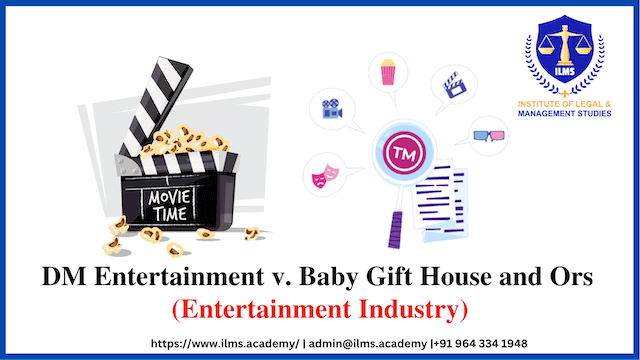
Case Background and Context:
The case of DM Entertainment v. Baby Gift House and Ors. presents a unique perspective on trademark law in India. DM Entertainment, a well-established entertainment company, found itself in a legal dispute with Baby Gift House and others, who were operating a business unrelated to entertainment. The central issue in this case was the alleged infringement of DM Entertainment’s trademark and the broader implications for trademarks in different industry domains.
DM Entertainment had built a strong brand presence associated with entertainment services, including music, events, and media. On the other hand, Baby Gift House was involved in the business of selling baby products and gifts, a seemingly unrelated field. However, DM Entertainment argued that the use of a trademark similar to its own created confusion among consumers, leading them to believe there was some affiliation between the two entities.
Discussion of Key Issues Involved:
1. Cross-Industry Trademark Dispute: The primary issue revolved around the concept of cross-industry trademark disputes. Traditionally, trademark disputes occurred within the same or closely related industries. In this case, the key question was whether a trademark in one industry could be infringed upon by a business in an entirely different sector. This raised questions about the scope and limitations of trademark protection.
2. Consumer Confusion: The case highlighted the core objective of trademark law – preventing consumer confusion. DM Entertainment argued that consumers could mistakenly associate Baby Gift House with its entertainment services due to the similarity in the trademarks. This issue brought forth the importance of protecting not only the trademark owner’s interests but also the consumer’s right to clear and distinct branding.
The Court’s Decision and Its Impact on Trademark Law:
The court’s decision in DM Entertainment v. Baby Gift House and Ors. was significant. It ruled in favor of DM Entertainment, emphasizing that trademark protection extends to situations where there is a likelihood of confusion among consumers, even when the businesses operate in different industries. The court recognized that the goodwill and reputation of a trademark could transcend industry boundaries.
This decision had a notable impact on trademark law in India. It established a precedent that expanded the scope of trademark protection beyond traditional industry lines. It reinforced the principle that trademark infringement is not limited to identical or closely related goods and services but can extend to situations where the use of a similar trademark may cause confusion among consumers.
The case also highlighted the importance of conducting comprehensive trademark searches before adopting a trademark, even in industries seemingly unrelated to the one where the trademark is originally registered. It underscored the need for businesses to be vigilant and proactive in safeguarding their trademarks to prevent any potential misuse or dilution.
In conclusion, DM Entertainment v. Baby Gift House and Ors. marked a significant development in Indian trademark law by recognizing the potential for cross-industry trademark disputes and emphasizing the importance of consumer protection through the prevention of confusion. This case serves as a reminder to businesses that trademark protection should be a top priority, regardless of their industry, to maintain brand integrity and consumer trust.
Case Study 3: Milmet Oftho Industries & Ors. V. Allergan Inc. (Pharmaceutical Trademarks)

Case Background and Context:
The case of Milmet Oftho Industries & Ors. v. Allergan Inc. stands as a pivotal moment in Indian trademark law, particularly within the context of the pharmaceutical industry. Milmet Oftho Industries and other plaintiffs were involved in the production and sale of ophthalmic pharmaceutical products, while Allergan Inc. was a global pharmaceutical giant known for its specialized products in the same field. The dispute centered on the use of a trademark that closely resembled Allergan’s well-established brand.
Allergan Inc. had built a strong reputation for its ophthalmic products, and its trademark was widely recognized by healthcare professionals and consumers alike. Milmet Oftho Industries and the other defendants had adopted a trademark for their products that bore a striking similarity to Allergan’s trademark, leading to allegations of trademark infringement and the potential for consumer confusion.
Discussion of Key Issues Involved:
Trademark Infringement in Pharmaceutical Industry: The primary issue at hand was trademark infringement within the pharmaceutical industry. Given the critical nature of pharmaceutical products, consumers rely heavily on branding and product identification. The case raised questions about the extent of trademark protection within this industry and the potential risks to patient safety and trust.
Similarity and Likelihood of Confusion: Central to the case was the assessment of the similarity between the trademarks and the likelihood of confusion among healthcare professionals and patients. The court had to determine whether the defendants’ use of a similar trademark could lead to confusion regarding the source or quality of the products.
The Court’s Decision and Its Impact on Trademark Law:
In its decision, the court ruled in favor of Allergan Inc. The judgment emphasized the importance of protecting trademarks in the pharmaceutical sector, where product safety and consumer trust are paramount. The court recognized that Allergan’s trademark had achieved a high level of recognition and goodwill among healthcare professionals, making it crucial to prevent any potential confusion that could jeopardize patient safety.
The impact of the Milmet Oftho Industries & Ors. v. Allergan Inc. case was profound in the realm of trademark law, particularly within the pharmaceutical industry. It established a clear precedent that prioritized consumer safety and trust over any potential competitive advantages gained through a similar trademark. The judgment reaffirmed that trademark protection in the pharmaceutical sector is critical to maintain the integrity of the products and ensure that consumers can make informed choices about their healthcare.
Furthermore, the case highlighted the need for stringent trademark examination and enforcement within the pharmaceutical industry. It served as a warning to companies operating in this sector that adopting trademarks resembling established brands could result in legal consequences that go beyond the typical concerns of brand competition.
In conclusion, the Milmet Oftho Industries & Ors. v. Allergan Inc. case showcased the significance of trademark protection in the pharmaceutical industry, emphasizing the paramount importance of patient safety and trust. This landmark decision reinforced the principles of trademark law in safeguarding consumer interests and preventing any potential confusion that could compromise the integrity of pharmaceutical products.
Case Study 4:The Coca Cola Company v. Bisleri International Pvt. Ltd. (Beverage Giants Clash)
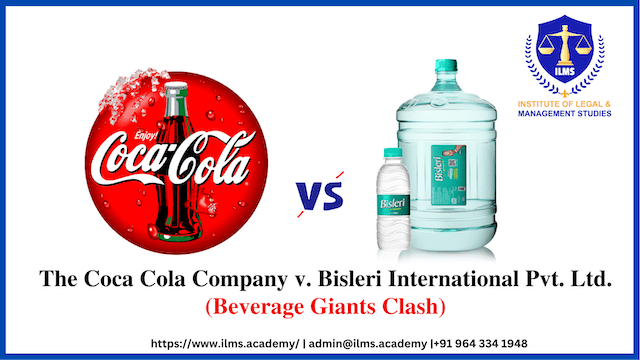
Case Background and Context:
The case of The Coca Cola Company v. Bisleri International Pvt. Ltd. represents a significant trademark dispute within the beverage industry in India. The Coca Cola Company, a global beverage giant, was engaged in the production and sale of soft drinks, including its iconic Coca-Cola brand. Bisleri International Pvt. Ltd., on the other hand, was a well-known player in the bottled water industry.
The central issue in this case was the alleged infringement of The Coca Cola Company’s trademark by Bisleri. Bisleri had introduced a new product, which was a range of flavored and carbonated water beverages, using the name ‘Bisleri Pop.’ The Coca Cola Company argued that the use of the term ‘Pop’ in Bisleri’s product name created confusion among consumers, leading them to associate it with Coca-Cola’s popular soft drinks.
Discussion of Key Issues Involved:
Trademark Dilution and Brand Identity: The primary issue in this case was whether the use of the term ‘Pop’ by Bisleri diluted the distinctiveness of The Coca Cola Company’s brand. It raised questions about the extent to which trademark protection can safeguard a brand’s identity and reputation.
Consumer Perception: The case required an examination of how consumers perceived the term ‘Pop’ in the context of beverages. The key issue was whether consumers were likely to be confused or misled into thinking that Bisleri’s product was somehow connected to or endorsed by The Coca Cola Company.
The Court’s Decision and Its Impact on Trademark Law:
In its decision, the court ruled in favor of The Coca Cola Company. The judgment emphasized the importance of protecting the brand identity and distinctiveness of well-known trademarks. The court recognized that The Coca Cola Company’s brand had achieved a high level of recognition and goodwill among consumers, making it vital to prevent any potential confusion or dilution.
The impact of The Coca Cola Company v. Bisleri International Pvt. Ltd. case extended beyond the immediate parties involved. It reaffirmed the principle that well-known trademarks deserve robust protection to maintain their distinctiveness and prevent consumer confusion. The judgment underscored the importance of safeguarding the reputation and goodwill associated with a brand, especially when introducing new products or brand extensions.
Furthermore, the case highlighted the need for businesses to conduct thorough trademark searches and clearance checks before launching new products or using specific terms in their branding. It emphasized that adopting elements that closely resembled established trademarks could result in legal consequences that go beyond mere brand competition.
In conclusion, The Coca Cola Company v. Bisleri International Pvt. Ltd. case highlighted the significance of trademark protection in preserving brand identity and preventing confusion within the beverage industry. This landmark decision reinforced the principles of trademark law in safeguarding consumer interests and maintaining the integrity of well-known brands. It serves as a reminder to businesses that trademark protection should be a top priority to protect their brand’s reputation and prevent any potential dilution or confusion.
Case Study 5: Cadila HealthCare v. Cadila Pharmaceutical Ltd. (Trademark Distinctiveness)
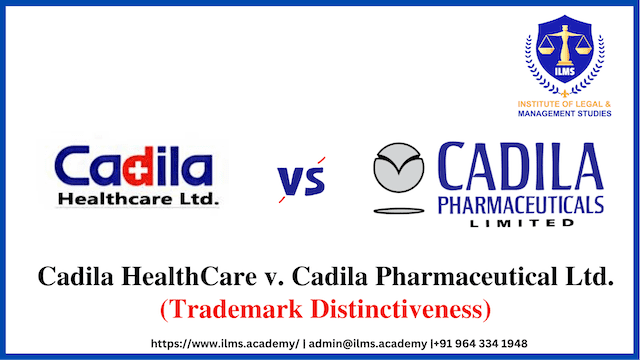
Case Background and Context:
The case of Cadila HealthCare v. Cadila Pharmaceutical Ltd. represents a significant trademark dispute within the pharmaceutical industry in India. Cadila HealthCare and Cadila Pharmaceutical Ltd. were two pharmaceutical companies operating in the Indian market. The central issue in this case was the alleged infringement of Cadila Health Care’s trademark by Cadila Pharmaceutical Ltd.
Cadila Health Care had established a strong presence in the pharmaceutical sector, offering a range of healthcare products and medicines. Cadila Pharmaceutical Ltd., on the other hand, also operated in the same industry and had a similar name. Cadila Health Care contended that Cadila Pharmaceutical Ltd.’s use of a similar name and trademark could lead to confusion among healthcare professionals and consumers, potentially harming its brand and reputation.
Discussion of Key Issues Involved:
Trademark Confusion: The primary issue revolved around trademark confusion within the pharmaceutical industry. The case raised questions about the extent of trademark protection within the same industry and whether the similarity in names and trademarks was likely to confuse consumers for healthcare professionals.
Unfair Competition: In addition to trademark infringement, the case also touched upon the concept of unfair competition. Cadila Health Care argued that Cadila Pharmaceutical Ltd.’s use of a similar name and trademark constituted unfair competition by capitalizing on the reputation and goodwill of Cadila Health Care’s brand.
The Court’s Decision and Its Impact on Trademark Law:
In its decision, the court ruled in favor of Cadila HealthCare. The judgment emphasized the importance of protecting trademarks within the same industry to prevent consumer confusion and unfair competition. The court recognized that Cadila Health Care’s trademark had achieved a high level of recognition and goodwill among healthcare professionals and consumers, making it essential to safeguard against any potential confusion or unfair practices.
The impact of Cadila HealthCare v. Cadila Pharmaceutical Ltd. case had significant implications for trademark law in India, particularly within the pharmaceutical sector. It established a clear precedent that prioritized consumer protection and fair competition by preventing any potential confusion that could arise from similar names and trademarks within the same industry.
The judgment also underscored the importance of conducting thorough trademark searches and clearance checks before selecting a name or trademark within a specific industry. It served as a reminder to businesses operating in competitive sectors that adopting names or trademarks closely resembling established brands could lead to legal consequences beyond mere brand competition.
In conclusion, the Cadila HealthCare v. Cadila Pharmaceutical Ltd. case highlighted the significance of trademark protection in preserving consumer trust and preventing unfair competition within the pharmaceutical industry. This landmark decision reinforced the principles of trademark law in safeguarding consumer interests and maintaining the integrity of established brands, especially when operating in competitive markets. It serves as a precedent for businesses to prioritize trademark protection and avoid potential confusion and unfair practices.
Case Study 6: Renaissance Hotel Holdings Inc. v. B. Vijaya Sai And Others (Hospitality Sector)
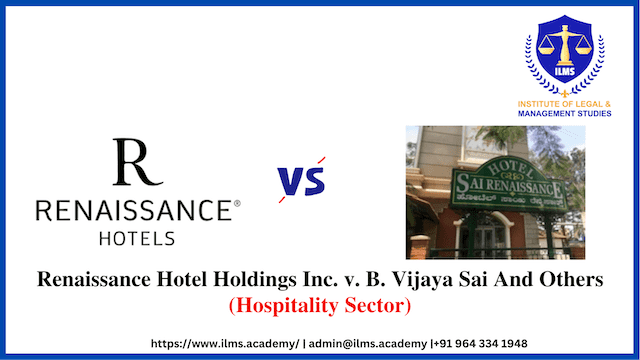
Case Background and Context:
The case of Renaissance Hotel Holdings Inc. v. B. Vijaya Sai and Others represents a notable trademark dispute within the hospitality industry in India. Renaissance Hotel Holdings Inc., a renowned global hotel chain, found itself in a legal battle with B. Vijaya Sai and others who were operating a hotel business using the name “Renaissance Hotel.”
Renaissance Hotel Holdings Inc. had established a strong brand presence in the hospitality sector, offering upscale accommodation and services under its “Renaissance” brand. The central issue in this case was the alleged infringement of Renaissance Hotel Holdings Inc.’s trademark and the potential confusion among consumers seeking accommodations.
Discussion of Key Issues Involved:
Trademark Infringement in Hospitality Industry: The primary issue revolved around trademark infringement within the hospitality industry. Renaissance Hotel Holdings Inc. contended that the use of the name “Renaissance Hotel” by B. Vijaya Sai and others could mislead consumers into believing that the two businesses were affiliated or endorsed by the global hotel chain. This raised questions about the scope of trademark protection within the same industry.
Consumer Confusion and Brand Dilution: The case required an examination of whether the use of a similar trademark could lead to consumer confusion or dilute the distinctiveness of the Renaissance brand. It also addressed the potential harm to the reputation and goodwill associated with the global hotel chain’s name.
The Court’s Decision and Its Impact on Trademark Law:
In its decision, the court ruled in favor of Renaissance Hotel Holdings Inc. The judgment emphasized the importance of protecting well-known trademarks within the same industry to prevent consumer confusion and brand dilution. The court recognized that Renaissance Hotel Holdings Inc.’s trademark had achieved a high level of recognition and goodwill among travelers and consumers, making it essential to safeguard against any potential confusion.
The impact of Renaissance Hotel Holdings Inc. v. B. Vijaya Sai and Others case was significant for trademark law in India, particularly within the hospitality sector. It set a precedent that prioritized consumer protection and the preservation of brand reputation within the industry. The judgment underscored the importance of trademark protection, especially when operating in a competitive sector where consumer trust and branding play a crucial role.
Furthermore, the case served as a reminder to businesses in the hospitality industry to conduct thorough trademark searches and clearance checks before adopting names or trademarks. It highlighted the potential legal consequences of using names or trademarks closely resembling those of established brands, particularly when it could lead to confusion among consumers.
In conclusion, Renaissance Hotel Holdings Inc. v. B. Vijaya Sai and Others case highlighted the significance of trademark protection in preserving consumer trust and preventing brand dilution within the hospitality industry. This landmark decision reinforced the principles of trademark law in safeguarding consumer interests and maintaining the integrity of well-known brands, especially in sectors where branding and reputation are paramount. It serves as a precedent for businesses in competitive industries to prioritize trademark protection and avoid potential confusion among consumers.
Case Study 7: Pernod Ricard India Private Limited V. Frost Falcon Distilleries Limited (Alcoholic Beverages)
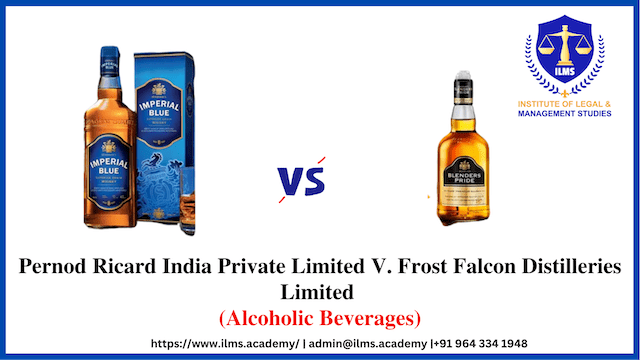
Case Background and Context:
The case of Pernod Ricard India Private Limited v. Frost Falcon Distilleries Limited is a notable trademark dispute within the alcoholic beverages industry in India. Pernod Ricard India Private Limited, a well-established global player in the alcoholic beverages sector, was engaged in the production and sale of spirits, including its renowned brand, “Ricard.” Frost Falcon Distilleries Limited, on the other hand, was also operating in the alcoholic beverages industry.
The central issue in this case was the alleged infringement of Pernod Ricard India Private Limited’s trademark by Frost Falcon Distilleries Limited. Pernod Ricard’s brand “Ricard” had achieved recognition and goodwill among consumers and was associated with a specific type of alcoholic beverage. The dispute centered around Frost Falcon’s use of a similar trademark, which raised concerns about potential confusion among consumers and harm to the reputation of Pernod Ricard’s brand.
Discussion of Key Issues Involved:
Trademark Infringement in Alcoholic Beverages Industry: The primary issue revolved around trademark infringement within the alcoholic beverages industry. Pernod Ricard India Private Limited argued that Frost Falcon Distilleries Limited’s use of a similar trademark could mislead consumers into believing that the two brands were related or endorsed by the global alcoholic beverages company. This raised questions about the extent of trademark protection within the same industry.
Consumer Confusion and Reputation: The case required an examination of whether the use of a similar trademark could lead to consumer confusion and harm the reputation and goodwill associated with Pernod Ricard’s brand. It also addressed the potential dilution of the distinctiveness of the “Ricard” brand.
The Court’s Decision and Its Impact on Trademark Law:
In its decision, the court ruled in favor of Pernod Ricard India Private Limited. The judgment emphasized the importance of protecting well-known trademarks within the same industry to prevent consumer confusion and safeguard brand reputation. The court recognized that Pernod Ricard’s “Ricard” trademark had achieved a high level of recognition and goodwill among consumers, making it essential to prevent any potential confusion.
The impact of the Pernod Ricard India Private Limited v. Frost Falcon Distilleries Limited case was significant for trademark law in India, particularly within the alcoholic beverages sector. It set a precedent that prioritized consumer protection and the preservation of brand reputation within the industry. The judgment underscored the importance of trademark protection, especially when operating in a sector where consumer trust and branding are crucial factors.
Furthermore, the case served as a reminder to businesses in the alcoholic beverages industry to conduct thorough trademark searches and clearance checks before adopting names or trademarks. It highlighted the potential legal consequences of using names or trademarks closely resembling those of established brands, particularly when it could lead to confusion among consumers.
In conclusion, the Pernod Ricard India Private Limited v. Frost Falcon Distilleries Limited case highlighted the significance of trademark protection in preserving consumer trust and preventing brand dilution within the alcoholic beverages industry. This landmark decision reinforced the principles of trademark law in safeguarding consumer interests and maintaining the integrity of well-known brands, especially in sectors where branding and reputation are of paramount importance. It serves as a precedent for businesses in competitive industries to prioritize trademark protection and avoid potential confusion among consumers.
Case Study 8: RPG Enterprises Limited V. Riju Ghoshal Trading As RPG (Trademark Similarity)
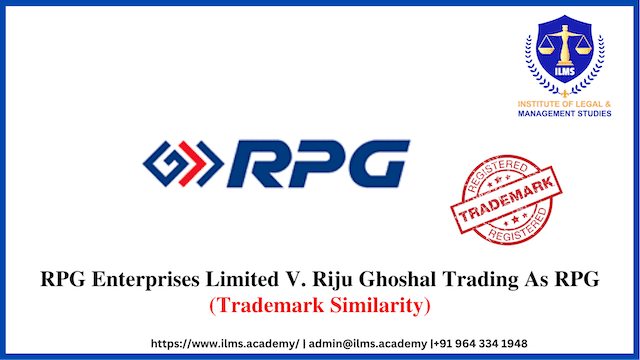
Case Background and Context:
The case of RPG Enterprises Limited v. Riju Ghoshal Trading As RPG is a trademark dispute that occurred within the corporate and business context in India. RPG Enterprises Limited, a well-established conglomerate with diverse business interests, was the plaintiff in this case. They had a trademark “RPG” associated with various businesses they operated. On the other side, Riju Ghoshal was operating a business using the name “RPG” as well.
The central issue in this case was the alleged infringement of RPG Enterprises Limited’s trademark by Riju Ghoshal. RPG Enterprises argued that the use of the same trademark by Riju Ghoshal could lead to confusion among consumers and business associates and harm the reputation and distinctiveness of their brand.
Discussion of Key Issues Involved:
Trademark Infringement in the Corporate Sector: The primary issue revolved around trademark infringement within the corporate and business sector. RPG Enterprises Limited contended that Riju Ghoshal’s use of the same trademark could mislead consumers and business partners into believing that the two entities were affiliated or endorsed by RPG Enterprises. This raised questions about the extent of trademark protection within the same business context.
Business Identity and Reputation: The case required an examination of whether the use of a similar trademark could lead to confusion and harm the business identity and reputation associated with RPG Enterprises Limited. It also addressed the potential dilution of the distinctiveness of the “RPG” brand in the corporate world.
The Court’s Decision and Its Impact on Trademark Law:
In its decision, the court ruled in favor of RPG Enterprises Limited. The judgment emphasized the importance of protecting trademarks in the corporate and business sector to prevent confusion among consumers, business associates, and other stakeholders. The court recognized that RPG Enterprises’ “RPG” trademark had achieved recognition and goodwill in the corporate world, making it essential to prevent any potential confusion.
The impact of RPG Enterprises Limited v. Riju Ghoshal Trading As RPG case was significant for trademark law in India, particularly within the corporate context. It set a precedent that prioritized the protection of business identity and reputation within the industry. The judgment underscored the importance of trademark protection, especially when operating in a sector where brand recognition and trust are crucial for business relationships and collaborations.
Furthermore, the case served as a reminder to businesses and entrepreneurs in the corporate world to conduct thorough trademark searches and clearance checks before adopting names or trademarks. It highlighted the potential legal consequences of using names or trademarks closely resembling those of established brands, particularly when it could lead to confusion among business partners and stakeholders.
In conclusion, RPG Enterprises Limited v. Riju Ghoshal Trading As RPG case highlighted the significance of trademark protection in preserving business identity and preventing confusion within the corporate and business sector. This landmark decision reinforced the principles of trademark law in safeguarding business interests and maintaining the integrity of well-known brands, especially in sectors where branding and reputation are essential for successful operations. It serves as a precedent for businesses in the corporate context to prioritize trademark protection and avoid potential confusion among stakeholders.
Case Study 9: ITC Ltd. v. Central Park Estates Private Ltd. (Real Estate Industry)
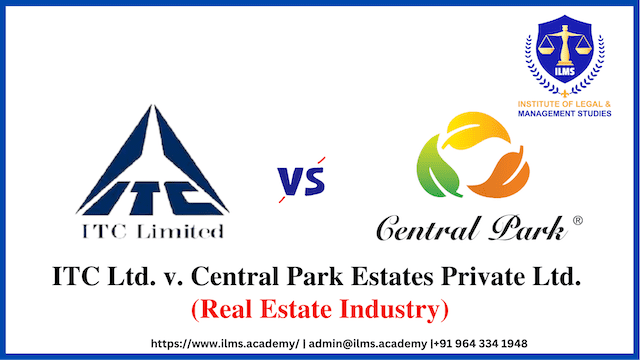
Case Background and Context:
The case of ITC Ltd. v. Central Park Estates Private Ltd. is a significant trademark dispute that unfolded in India within the real estate and property development sector. ITC Ltd., a diversified conglomerate with a presence in various industries, including hospitality, was the plaintiff in this case. Central Park Estates Private Ltd. was engaged in real estate and property development and was operating under the name “Central Park Estates.”
The central issue in this case was the alleged infringement of ITC Ltd.’s trademark by Central Park Estates Private Ltd. ITC Ltd. argued that the use of the name “Central Park” by the real estate company could lead to confusion among consumers and potential buyers, potentially harming ITC Ltd.’s reputation and brand identity, particularly in the hospitality industry.
Discussion of Key Issues Involved:
Trademark Infringement Across Industries: The primary issue revolved around trademark infringement across different industries. ITC Ltd. contended that Central Park Estates Private Ltd.’s use of a similar trademark could mislead consumers and potential property buyers into believing that the two entities were affiliated or endorsed by ITC Ltd. This raised questions about the scope of trademark protection across diverse business sectors.
Consumer Confusion and Brand Dilution: The case required an examination of whether the use of a similar trademark could lead to consumer confusion and dilution of the distinctiveness of ITC Ltd.’s brand in the hospitality industry. It also addressed potential harm to the reputation associated with the “ITC” trademark.
The Court’s Decision and Its Impact on Trademark Law:
In its decision, the court ruled in favor of ITC Ltd. The judgment emphasized the importance of protecting trademarks across different industries to prevent confusion among consumers and safeguard brand reputation. The court recognized that ITC Ltd.’s “ITC” trademark had achieved recognition and goodwill in the hospitality sector, making it crucial to prevent any potential confusion.
The impact of ITC Ltd. v. Central Park Estates Private Ltd. case was significant for trademark law in India, especially concerning the potential overlap of trademarks across diverse business sectors. It set a precedent that prioritized the protection of well-established trademarks, even when they operate in different industries. The judgment underscored the importance of trademark protection, especially when the trademark owner’s reputation and brand identity are at stake.
Furthermore, the case served as a reminder to businesses and entrepreneurs that conducting thorough trademark searches and clearance checks is essential before adopting names or trademarks, even in unrelated industries. It highlighted the potential legal consequences of using names or trademarks closely resembling those of established brands, particularly when it could lead to confusion among consumers or property buyers.
In conclusion, ITC Ltd. v. Central Park Estates Private Ltd. case highlighted the significance of trademark protection in preserving brand identity and preventing confusion across diverse business sectors. This landmark decision reinforced the principles of trademark law in safeguarding consumer interests and maintaining the integrity of well-known brands, even when operating in unrelated industries. It serves as a precedent for businesses to prioritize trademark protection and avoid potential confusion among consumers and property buyers, regardless of the industry.
Case Study 10: Sun Pharmaceuticals Industries v. Dwd Pharmaceuticals Ltd. (Pharmaceutical Trademarks)

Case Background and Context:
The case of Sun Pharmaceuticals Industries v. Dwd Pharmaceuticals Ltd. is a notable trademark dispute within the pharmaceutical industry in India. Sun Pharmaceuticals Industries, a prominent pharmaceutical company with a wide range of medical products, was the plaintiff in this case. Dwd Pharmaceuticals Ltd. was also engaged in the pharmaceutical industry.
The central issue in this case was the alleged infringement of Sun Pharmaceuticals Industries’ trademark by Dwd Pharmaceuticals Ltd. Sun Pharmaceuticals had established a strong brand presence associated with various pharmaceutical products. Dwd Pharmaceuticals Ltd. introduced a product with a trademark that bore a striking similarity to Sun Pharmaceuticals’ brand, raising concerns about potential confusion among healthcare professionals and consumers.
Discussion of Key Issues Involved:
Trademark Infringement in Pharmaceuticals: The primary issue revolved around trademark infringement within the pharmaceutical industry. Sun Pharmaceuticals Industries contended that Dwd Pharmaceuticals Ltd.’s use of a similar trademark could mislead healthcare professionals and consumers into believing that the two products were related or endorsed by Sun Pharmaceuticals. This raised questions about the scope of trademark protection within the same industry.
Consumer Safety and Trust: The case required an examination of how consumers and healthcare professionals perceived the similarity in trademarks and whether it could lead to potential harm, especially in the context of pharmaceuticals where patient safety and trust are paramount. It also addressed the potential dilution of the distinctiveness of Sun Pharmaceuticals’ brand.
The Court’s Decision and Its Impact on Trademark Law:
In its decision, the court ruled in favor of Sun Pharmaceuticals Industries. The judgment emphasized the importance of protecting trademarks within the pharmaceutical industry to prevent confusion among healthcare professionals, consumers, and to safeguard patient safety and trust. The court recognized that Sun Pharmaceuticals’ trademark had achieved a high level of recognition and goodwill in the pharmaceutical sector, making it crucial to prevent any potential confusion.
The impact of Sun Pharmaceuticals Industries v. Dwd Pharmaceuticals Ltd. case was significant for trademark law in India, particularly within the pharmaceutical sector. It reinforced the principles of trademark law that prioritize consumer protection, patient safety, and the preservation of brand reputation within industries where product safety and trust are paramount.
The case also highlighted the need for businesses operating in the pharmaceutical industry to conduct thorough trademark searches and clearance checks before adopting names or trademarks. It served as a reminder of the potential legal consequences of using names or trademarks closely resembling those of established brands, particularly when it could lead to confusion among healthcare professionals and consumers.
In conclusion, Sun Pharmaceuticals Industries v. Dwd Pharmaceuticals Ltd. case highlighted the significance of trademark protection in preserving patient safety, consumer trust, and brand identity within the pharmaceutical industry. This landmark decision reinforced the principles of trademark law in safeguarding consumer interests and maintaining the integrity of well-known brands, especially in sectors where product safety and trust are paramount. It serves as a precedent for businesses in the pharmaceutical sector to prioritize trademark protection and avoid potential confusion among healthcare professionals and consumers.
Conclusion:
The landmark trademark cases discussed, including those involving Yahoo!, Inc. v. Akash Arora & Anr., DM Entertainment v. Baby Gift House and Ors., Milmet Oftho Industries & Ors. v. Allergan Inc., The Coca Cola Company v. Bisleri International Pvt. Ltd., Cadila Health Care v. Cadila Pharmaceutical Ltd., Renaissance Hotel Holdings Inc. v. B. Vijaya Sai And Others, Pernod Ricard India Private Limited V. Frost Falcon Distilleries Limited, RPG Enterprises Limited V. Riju Ghoshal Trading As RPG, ITC Ltd. v. Central Park Estates Private Ltd., and Sun Pharmaceuticals Industries V. Dwd Pharmaceuticals Ltd., collectively emphasize several key points:
Protection of Brand Identity: These cases underscore the importance of trademark protection in preserving brand identity and reputation, regardless of the industry. Trademarks are vital assets that businesses should safeguard to prevent confusion among consumers, business partners, and stakeholders.
Consumer Trust: Trademark law in India prioritizes consumer trust and the prevention of confusion. Businesses should ensure that their trademarks do not mislead or confuse consumers, as this can have significant legal and financial consequences.
Evolution of Trademark Law: The evolution of trademark law in India is evident in these cases. Trademark law has expanded to encompass cross-industry disputes, emphasizing the need for comprehensive trademark searches and clearance checks. It places a premium on consumer protection, brand reputation, and goodwill.
Precedent-Setting Decisions: These cases have set important legal precedents in trademark law in India. They have established clear guidelines for the protection of well-known trademarks, even in unrelated industries. They underline the need for businesses to stay informed about legal precedents and to conduct thorough due diligence before adopting trademarks.
Importance of Staying Updated: Staying updated on legal precedents in trademark law is crucial for businesses operating in India. Trademark law is dynamic and can have a profound impact on a company’s ability to protect its brand and maintain its competitive edge.
In conclusion, these landmark cases have shaped trademark law in India by emphasizing the protection of brand identity, consumer trust, and the prevention of confusion. They underscore the need for businesses to prioritize trademark protection, conduct thorough trademark searches, and stay updated on legal precedents to ensure compliance with trademark laws and regulations.
FAQs
Q1. What is a trademark, and why is it important in India?
- A trademark is a symbol, word, or combination used to distinguish goods or services. It’s crucial in India to protect brand identity and prevent consumer confusion.
Q2. How do I register a trademark in India?
- To register a trademark in India, you need to apply to the Controller General of Patents, Designs, and Trademarks. The process involves filing an application, examination, and registration.
Q3. What protection does trademark registration offer in India?
- Trademark registration in India provides exclusive rights to use the mark for the registered goods or services, preventing others from using a similar mark.
Q4. Can I trademark a name that is similar to an existing brand in India?
- Generally, trademarks that are similar to existing brands may face objections. It’s important to conduct a thorough trademark search before applying.
Q5. What is the significance of well-known trademarks in India?
- Well-known trademarks receive stronger protection and can prevent the use of similar marks across different industries, as shown in landmark cases.
Q6. How can I enforce my trademark rights in India?
- You can enforce your trademark rights through legal actions, such as filing infringement suits and seeking injunctive relief, as demonstrated in the discussed cases.
Q7. What is the role of consumer confusion in trademark disputes in India?
- Consumer confusion is a critical factor. If a trademark is likely to cause confusion among consumers, it may lead to legal action for trademark infringement.
Q8. How does trademark law affect businesses in India’s competitive landscape?
- Trademark law impacts businesses by protecting their brand reputation, preventing unfair competition, and ensuring consumer trust.
Q9. What precautions should businesses take to avoid trademark disputes in India?
- Businesses should conduct comprehensive trademark searches, clearance checks, and ensure their trademarks do not resemble well-known brands in unrelated industries.
Q10. Why is it essential to stay updated on trademark law precedents in India?
- Staying updated on trademark law precedents is crucial to understand evolving legal standards, protect brand assets, and make informed decisions when adopting or using trademarks.
Certificate Course in Labour Laws
Certificate Course in Drafting of Pleadings
Certificate Programme in Train The Trainer (TTT) PoSH
Certificate course in Contract Drafting
Certificate Course in HRM (Human Resource Management)
Online Certificate course on RTI (English/हिंदी)
Guide to setup Startup in India
HR Analytics Certification Course
